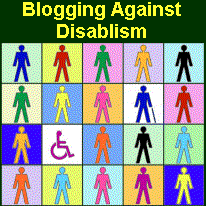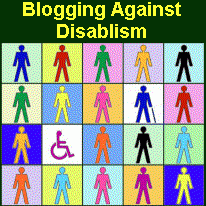This is a post for Blogging Against Disablism Day 2016. Please visit the website to see the other posts. It’s a day late as it’s my second attempt at a post (thanks brain fog).
These are things I want to see. It is not exhaustive.
I want to see more people like me in fiction, as normal characters. Disabled, different, maybe chronically ill, but that being only part of what the character is about.
I want to see more progress in making things accessible for more disabled people. More ramps, lifts, alternative formats for information. More changing places toilets (toilets with a hoist, adult changing bench, plenty of room for a wheelchair and carers and other facilities for severely disabled people). Less blocking access, displays making it impossible to pass in a wheelchair, less unnecessary noise and strobe lights.
I want to see disabled people accepted for who they are. Not used as inspiration porn or pitied. Disability is a normal part of life so should be treated as such.
I want less overt and covert discrimination against disabled people. Less refusal to make reasonable adjustments. Less making disabled people jump through hoops non-disabled people don’t have to do.
I want to see more access information provided on websites, and the websites themselves to be accessible. I want that information to be easy to find, not requiring looking through layers of menus to discover.
I want people to see disability equipment to be seen for what they are, tools that enable people to do what they want easier (or at all). Wheelchairs and scooters are awesome and allow so many people to do more than they otherwise could.
I want people to be valued for who they are, not what they’re able to do. We all deserve a full, peaceful, dignified life, making our own choices as much as able.
I want variable disabilities to be understood better. Just because someone can do something at one time, that doesn’t mean they can do it the next time, or in different circumstances, or more than once.
I want the harassment of disabled people to end, especially by governments and the media. I want benefits to be easier and quicker to claim, without the presumption that we’re all frauds. We’re not to blame for the financial crisis.
I want to see disabled people living where they want, with the help they need to do so. I want to see hospitals only used when absolutely required and for the shortest period that’s needed. I want carers to receive the help they need to care for their loved ones if they want to.
I want people to be seen as individuals. We all have our own life experiences, likes, dislikes and thoughts. We’re not just a collection of diagnoses.
I want to see a nicer, more equal world. I believe it’s possible.

